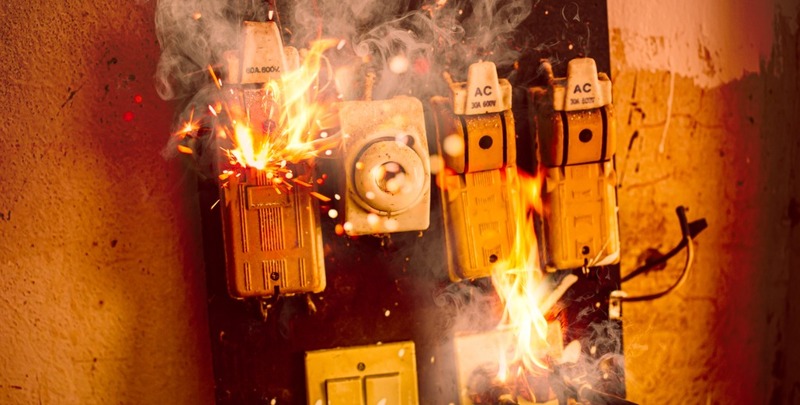
Electricity, Emergencies and Your Expectations
Electricity is such an ingrained part of the modern world that we often take it for granted – until an electrical emergency occurs. It is crucial to remember that electricity can be dangerous, and that an electrical fault can be hazardous if not dealt with safely.
An electrical emergency can be caused by faulty wiring, malfunctioning electrical appliances, a storm, flooding, a power outage or any number of things. It can lead to electric shocks, electrical fires and extreme damage to your home. That’s why it’s important to know something about your electrical system and what to do in an emergency.
Would you know what to do if a work colleague or family suffered an electric shock? Or what to do in the event of an electrical fire? Let’s take a look at each of these common electrical emergencies and determine the best course of action for each.
But First … Electric Shock vs Electrocution
No doubt you would have heard each of these terms used many times before. But do you know if they are interchangeable terms, or whether there’s a difference between them?
For the most part, both an electric shock and electrocution are one and the same. Human bodies are highly conductive of electricity, being composed of 60-70% water. Because water conducts electricity so easily, the human body is highly susceptible to electrical shock if it comes into contact with a continuous current or a high-voltage surge of electricity.
Often the source can be an appliance or powerpoint. The electrical current courses through the body, causing the person to experience a shock.
The key difference between electric shocks and electrocution is that the latter is typically the term used for a shock that becomes fatal.
Electrical Emergency – What to Look Out for When a Shock Occurs
There are numerous signs and symptoms that present when electric shocks occur; most of which are generally easy to identify. They include:
- Unconsciousness
- When a person immediately collapses after touching an electrical appliance or a powerpoint
- Deep entry and exit burns on the body
- Irregular, erratic breathing
- Cardiac arrest
- No pulse, or pulse is weak
Electric shocks can result in burns to the skin and internal tissues. It can also result in the heart experiencing electrical disruption, which can itself lead to the heart stopping, or just beating intermittently.
If you encounter anyone displaying these signs or symptoms, call Triple Zero (000) immediately for an ambulance.

Electrical Safety Measures for When Serious Electric Shock Occurs
There are numerous ways that a shock to the body can occur, from faulty electrical appliances to frayed extension cords to lightning strikes, among many other causes.
So, what should you do when someone suffers an electric shock? St John Ambulance provides a comprehensive, step-by-step procedure designed to create the safest possible environment for everyone.
- First and foremost, ensure there is no danger to yourself or to others in the area. Try to avoid touching the shocked person as you may also get shocked. If you’ve had first aid training your first instinct might be to perform CPR, but because human bodies conduct electricity you’re best waiting until the power supply has been shut off and the situation deemed safe by the authorities.
- Electrical burns should always be treated with medical assistance, so be sure to call for an ambulance on Triple Zero (000).
- If you are able to, cut off the main power to avoid any further electrical hazard.
- Try and isolate the casualty from the power source without coming into direct physical contact with them. Best to do this with dry materials that are not conductive, such as a wooden broom handle that is free of moisture.
- Apply large volumes of cold water for up to 20 minutes to any burnt areas in order to try and keep them cool.
- If safe to do so, try and remove any clothing or jewellery from the impacted area on the body, unless clothes or jewellery are physically stuck to the burn.
- Apply a dressing that is light and non-sticky to the burnt area. Alternatively, a dry, non-fluffy material can also be applied.
- Ensure the casualty continues to remain calm and reassured.
Always remember to consider your own safety and that of others. After all, we don’t want any more casualties that could otherwise have been easily avoided.
A tripped circuit breaker should shut down your system, but always make sure the power is turned off at the main switch if there’s still any danger.
Electrical Emergency – What to Do in an Electrical Fire
The most common causes of electrical fires in the home are old or ageing electrical wiring or powerpoints, overworked power boards, using appliances that are faulty, and misusing electrical equipment.
Putting out an electrical fire with a water-filled fire extinguisher is highly dangerous – absolutely the wrong way to go about it – so what should you do? Follow these instructions for a process that maximises the safety of everyone involved.
- Before anything, if there is no way to safely put out the fire without putting yourself or others at risk, don’t do it. Exercise extreme caution: call Triple Zero (000) immediately and evacuate the house.
- If the electrical fire is small enough to attempt to put out yourself, once again do not attempt to extinguish it with water. Water is highly conductive of electricity, so using a water-filled fire extinguisher on an electrical fire will only worsen the situation.
- Electrical fires are considered Class E fires and should be extinguished using dry chemical extinguishers.
- If safe to do so, turn off the power at the wall, and unplug the appliance that has sparked the fire. You can also try cutting off the power supply at the switchboard if turning it off at the source doesn’t work.
- Another suggestion is to douse the fire in baking soda or bicarbonate of soda, if the fire is small (and again, if safe to do so).
As previously stated, if attempting to put out the fire yourself is going to put your life in danger, or others at risk, just call 000 and let the professional emergency services take care of it as you get out of the house. It’s much safer for everyone than risking yet another electrical emergency.

Electrical Emergency Prevention is Better Than Cure
As with many circumstances that can lead to hazardous situations, preventing electric shock or electrical fires in the first place is preferable to having to deal with the aftermath.
To prevent (or at the very least reduce the risk of) electrical fires occurring in your home:
- Don’t use extension cords that have frayed or are showing signs of wearing out.
- Upgrade any light switches or power points that might be near to or over 20 years old.
- Consider any necessary electrical rewiring in your home, especially if there is existing poor wiring or it is ageing significantly
- If you notice any burning smells, fluctuations in power, flickering lights or loose powerpoints, DO NOT ignore them. They can be signs of a potential hazard waiting to happen.
If you can’t remember the last time you had all the appliances in your home serviced, it’s probably been too long.
A licensed emergency electrician can assess everything from electric hot water heaters to heating appliances to refrigerators to determine whether they remain in prime working condition, or whether they need to be repaired or replaced.
They can also detect any other potential electrical faults in your home, including examining any circuit breakers and surge protectors, assessing any potential faulty wiring issues, and providing any rewiring service and advice if necessary.
How to Deal with Fallen Power Lines
Stormy weather and very strong winds can lead to fallen power lines that can land on your property. They pose a serious threat to the safety of you and your home.
Like any other electrical issues, a fallen power line needs to be treated with the utmost consideration and care.
If you come across a downed power line on your property:
- Be sure to keep at least 10 metres away. Do not touch any power lines and encourage others to stay away as well.
- Be aware of the surrounding area; keep away from any metal fences or other conductive materials that may be hazardous.
- Do not take any risks; there may still be electrical currents running through the power lines that can be significantly life-threatening.
For any potentially life-threatening electrical problems, call the local authorities in your state.
When it Comes to Electrical Emergencies
Electrical emergencies can be stressful and confronting when in the moment, with the potential for numerous risks occurring.
For power outages and other basic electrical problems, call an emergency electrician. For more serious incidents such as electric shocks and fires, call 000.
The right processes in place give you and your family the best chance of coming out the other end of almost any electrical emergency situation with minimal disruption and damage.
And with the professional aid of a skilled electrical contractor, preventative maintenance can help reduce the likelihood of an electrical emergency occurring altogether.
Please note: This information is provided for advice purposes only. Regulations differ from state to state, so please consult your local authorities or an industry professional before proceeding with any work. See our Terms & Conditions here.


